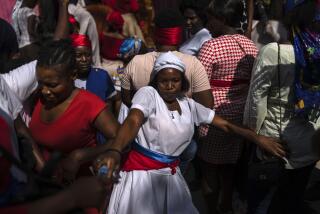The Comedians
- Share via
Haiti is “a country where people are poor in money perhaps, but rich in culture,” a festival organizer in Jacmel, a southern coastal city, tells Edwidge Danticat, who left Haiti at 12 (almost 30 years ago) when her family moved to the United States.
“Carnival is our chance to show our kind of wealth.” Readers of Danticat’s fiction--the novels “Breath, Eyes, Memory” and “The Farming of Bones” and the short-story collection “Krik? Krak!”--may be initially disappointed that this book is a travel piece, commissioned for the Crown Journeys series. (The publisher’s idea: to send great writers to places they know or would love to visit and have them take a walk and write about it.)
Yet Danticat makes Haiti, at least Jacmel at Carnival time, a place we’d like to visit--a considerable feat, given that nation’s image. For generations, almost everything we have read about Haiti--from Graham Greene’s “The Comedians” to Madison Smartt Bell’s slave-revolt novels to news reports of atrocities and refugees--has reinforced our idea of the place as a sink of violence, poverty and hopelessness.
Danticat had a personal reason for going to Jacmel, the site of Haiti’s most famous Carnival celebration, in the winter of 2001. As a child, she was discouraged from attending Carnival. Well-meaning relatives warned her of the dangers of crowds of drunken revelers, of zombies and demons, of dirty old men who would squeeze young girls “like sponges.” She wanted to experience the festival without the fear--and, in so doing, discovered that the exorcism of fear is Carnival’s very purpose.
One of the sources of longtime dictator Francois “Papa Doc” Duvalier’s power, Danticat says, was his ability to twist this usually benign magic in his favor. He would often dress in black like the voodoo god Baron Samedi, lord of cemeteries, “reminding all Haitians that he literally held the key to the cemeteries and could decide at will who the next inhabitants would be.”
More commonly, Carnival costumes and masks are meant to reassure as well as scare. A chaloska, a character “in military garb with a protruding mouth and claw-like teeth,” Danticat says, is “based on an actual military officer, Charles Oscar Etienne, who terrorized Jacmel in the early 1900s.” Children are taught to say: “Chaloska, I’m not afraid of you; you’re a human being.”
Carnival “zombies” elicit the same response. Danticat recalls, as a child, hearing a radio report that zombies had been seen wandering in Haiti’s northern mountains. Her aunt concluded that they were “former political prisoners ... who were so mentally damaged by dictatorship-sponsored torture that they had become either crazy or slow.” The aunt “doubted that any relatives would go and get them, for fear of being locked up themselves.”
Political messages simmer on the surface of the celebration. Some Carnival characters are slaves and masters from French colonial times. The most popular float at the 2001 event portrayed a U.S. Coast Guard cutter intercepting a raft of Haitian refugees, many of whom “drowned.” A song blared, “We are selling the country in U.S. dollars,” within earshot of the U.S. ambassador.
On the other hand, one of the heroic characters at the Jacmel Carnival is based on a U.S. Army sergeant, Sam Makanani, who rode into town in his Humvee during the 1994 invasion to reinstate President Jean-Bertrand Aristide and collar the military government’s goons. “The Cowboy,” like the chaloska, has been immortalized in papier-mache masks and dance.
Danticat tells us more than we need to know about the origins of Carnival in antiquity. Haiti is interesting enough. She walks through cemeteries, farms and one of the country’s few remaining forests. She talks to preachers, vendors, musicians, poets and the organizers for whom Carnival has become a way of life. She quotes writers we should know better, such as the Jacmel-born novelist Rene Depestre. Finally she joins the dancers, sloughing off her childhood fears to participate in “explosions of rapture and beauty in a country that is not supposed to have any joy.”
More to Read
Sign up for our Book Club newsletter
Get the latest news, events and more from the Los Angeles Times Book Club, and help us get L.A. reading and talking.
You may occasionally receive promotional content from the Los Angeles Times.







